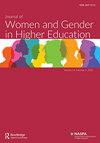女性RISE(STEM和STEM教育研究)
Q2 Social Sciences
Journal of Women and Gender in Higher Education
Pub Date : 2021-09-02
DOI:10.1080/26379112.2021.1962335
引用次数: 0
摘要
女性RISE(科学、技术、工程和数学研究[STEM]和STEM教育)计划通过证明女性教师及其指导的女性学生的专业发展,实现了在STEM领域招募更多有色人种女性的目标。很明显,STEM中缺乏黑人女性的问题是性别和种族的交叉点,因为根据密西西比州(项目所在州)2015年的妇女地位报告,在STEM领域工作的人中,只有大约32.9%是女性(妇女政策研究所,2015年)。没有按种族分列的数据。然而,在全国范围内,当考虑种族时,黑人女性约占STEM劳动力的7%(2018年,400万美元为国家增加STEM领域少数族裔的努力提供了资金;Blackburn,2017年)。在受雇于四年制学院或大学的64.9万名女科学家和工程师中,黑人不到11%(国家科学基金会,2019年)。非裔美国人教师的比例如此之低并不奇怪,因为2017年,只有8.1%的理工学士学位、6.3%的硕士学位和4.7%的博士学位授予了非裔美国人(国家科学委员会,国家科学基金会,2019)。2019年,瑟古德·马歇尔学院基金会资助了女性RISE项目,该项目是与杰克逊州立大学(JSU)和全国百名黑人女性联盟股份有限公司密西西比州中部分会(NCBW)的合作项目,通过竞争性申请为期8个月的STEM意识补助金,该项目成为可能。JSU是一所历史悠久的黑人学院或大学(HBCU),是一所研究活跃度很高的博士大学。妇女RISE项目由两个主要活动组成:一个是海报展示的研究研讨会,另一个是同行评审期刊。本文章由计算机程序翻译,如有差异,请以英文原文为准。
Women RISE (Research in STEM and STEM Education)
The Women RISE (Research in Science, Technology, Engineering, and Mathematics [STEM] and STEM Education) program approached the objective of recruiting more Women of Color in STEM by substantiating a professional development for the women faculty and the women students they mentor. It is evident that the issue of the lack of Black women in STEM lies at the intersection of gender and race, because according to the 2015 report of the Status of Women in Mississippi (the state where the project took place), only approximately 32.9% of those working in STEM fields were women (Institute for Women’s Policy Research, 2015). The data disaggregated by race are not available. However, nationally, when considering race, Black women comprised around 7% of the STEM workforce ($4M fuels state effort to increase minorities in STEM fields, 2018; Blackburn, 2017). Of the 649,000 women scientists and engineers employed in 4-year colleges or universities, fewer than 11% are Black (National Science Foundation, 2019). This low percentage of African American faculty should come as no surprise as just 8.1% of bachelor’s, 6.3% of master’s, and 4.7% of doctoral degrees in science and engineering were awarded to African Americans in 2017 (National Science Board, National Science Foundation, 2019). The Women RISE project was funded by the Thurgood Marshall College Fund in 2019 as a collaborative project with Jackson State University (JSU) and the National Coalition of One Hundred Black Women, Inc., Central Mississippi Chapter (NCBW) made possible through a competitive application for an 8-month, STEM Awareness grant. JSU, a Historically Black College or University (HBCU), is a doctoral university with high research activity. The Women RISE program consisted of two major events: a research symposium with poster presentations and a peer-reviewed journal.
求助全文
通过发布文献求助,成功后即可免费获取论文全文。
去求助
来源期刊

Journal of Women and Gender in Higher Education
Social Sciences-Gender Studies
CiteScore
1.40
自引率
0.00%
发文量
20
 求助内容:
求助内容: 应助结果提醒方式:
应助结果提醒方式:


